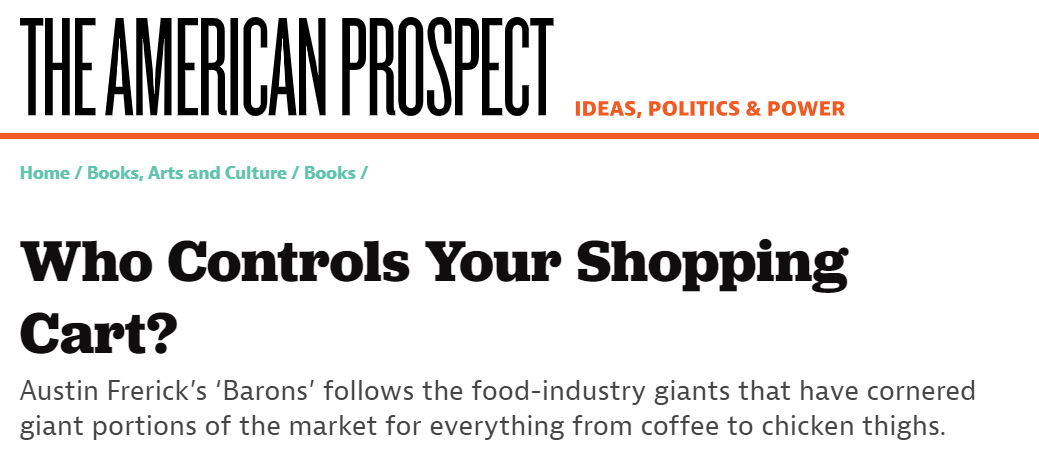General Discussion
Related: Editorials & Other Articles, Issue Forums, Alliance Forums, Region ForumsWho Controls Your Shopping Cart?

https://prospect.org/culture/books/2024-03-26-who-controls-your-shopping-cart-frerick-review/

In January of 2022, more than 8,000 employees at King Soopers stores in the Denver area went on strike demanding higher wages, better health care coverage, and stronger store security. After ten days, they reached a tentative agreement with the grocery chain, which is owned by Kroger. According to the union, the new contract included wage increases of $2 or more per hour in the first year for more than 95 percent of workers, topping out at an increase of $5.99 per hour. King Soopers agreed to invest more than $170 million in wages throughout the three-year agreement, plus more for health care. Leading up to the strike, the King Soopers union encouraged customers to move their shopping and prescriptions to the chain’s competitor, Albertsons. Once the King Soopers contract was ratified, the United Food and Commercial Workers (UFCW) Local 7 union was able to leverage the threat of another strike to persuade Albertsons to implement the same wage increases, according to a Federal Trade Commission complaint filed in late February.
The union capitalized on competition between leading employers to secure higher wages across the board. (It’s possible the retailers worked together behind the scenes to limit the impact of this strategy: A 2024 lawsuit filed by the Colorado attorney general alleges Albertsons promised not to poach any King Soopers employees during the strike.) Months later, King Soopers’ parent Kroger announced plans to purchase Albertsons in a $24.6 billion deal. It was the largest proposed supermarket merger in the history of U.S. grocery, and would bring Kroger- and Albertsons-owned brands under the same umbrella, including Harris Teeter, Safeway, Ralphs, Fred Meyer, Shaw’s, Acme Markets, and more. A subsequent lawsuit alleged that the retailers’ close relationship preceded the merger announcement. Had this merger happened before the 2022 strike, the outcome for King Soopers workers might have been very different. As the Federal Trade Commission (FTC) wrote in its complaint, “the combined Kroger/Albertsons would likely be able to impose terms on union grocery workers that slow wage increases.”

Arguing that the merger had the potential to raise prices for customers while simultaneously weakening unions’ bargaining power, the FTC sued to block the deal in late February 2024. Several state attorneys general joined the lawsuit, including the Republican attorney general of Wyoming. News of the government’s intervention came at a time of heightened political scrutiny of the food industry. The cost of groceries has risen by more than 25 percent since February 2020, the fastest since the 1970s. As President Biden fights for re-election in November, an internal White House analysis recently showed that grocery prices are the single largest factor dragging down consumer economic sentiment, The New York Times reported. The Biden administration has linked food-industry inflation to corporate consolidation, arguing that a handful of powerful companies are taking advantage of their overwhelming market share to hike prices and goose profit margins. In public appearances, the president has been harping on “shrinkflation”—a phenomenon in which companies quietly reduce the amount of food in a package without lowering the price—targeting snack brands in a Super Bowl–themed ad and working the concept into the State of the Union address.
Anti-monopoly messaging seems to have some bipartisan appeal. Republican Sen. J.D. Vance (R-OH) said FTC chair Lina Khan was “one of the few people in the Biden administration that I think is doing a pretty good job” the day after the Kroger lawsuit was filed. (Elsewhere, Republicans have been hitting the food-cost angle hard, but many blame rising prices on Biden’s economic policies, not corporate greed.) In addition to the bully pulpit, President Biden has promised to challenge food-industry power players by fighting mergers like the Kroger-Albertsons deal, promoting competition, and prosecuting anti-competitive behavior throughout the industry. The prosecution side of the equation, largely handled by the Department of Justice, has had uneven results: Various Antitrust Division actions have ended in acquittals for executives charged with price-fixing and settlements for chicken companies accused of wage-fixing. The Antitrust Division last year issued another lawsuit against Agri Stats, a company that provides granular information to meat processors that prosecutors say is used as an illegal collusion tool to raise prices.
snip
LastDemocratInSC
(3,647 posts)Sympthsical
(9,074 posts)We slide in once in awhile to get their generic zero sugar soda for $1.29 a two liter and if avocados are on sale. That's about it. Fortunate to have a Costco a mile down the street, so pretty much everything we use comes from there.
I don't get it. Every time I'm in Safeway, I'm looking at prices and thinking, "How do working class people afford any of this?" Meat and dairy are just out of pocket. The snack aisle is a scene. $6 for a regular ole bag of chips? You can go get the monster, just-fuck-your-doctor's-shit-up size of Ruffles at Costco for $7. $5 if it's on sale. Coffee? $14 for a can that is half the size of the $11 can at Costco. Chicken, basic chicken, is $5/lb. It's $2.20/lbs at Costco. Safeway eggs, $5/dz. They're $2.50/dz at Costco. We don't buy ice cream - I make my own with cream/milk, splenda, and frozen fruit - but when I saw $7.50 per container of it the other day, I thought, "Who's buying this?!"
And just on and on.
It makes zero sense to spend any significant time or money at a Safeway. People may shrink from the $60 Costco fee, but given what the hell's going on at the grocery store, you'll probably get that back after like two trips.
And when people ask, "Why don't people think the economy is doing great?" That. It's that. They see that mess in their wallets every week.